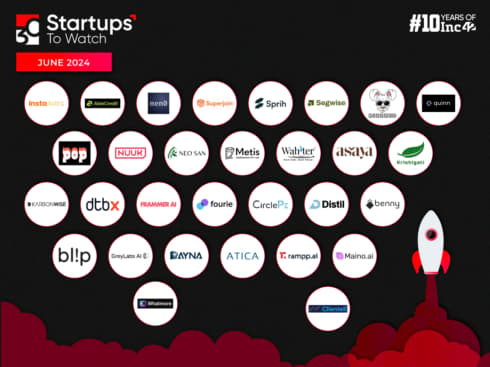The country's bend towards growing its semiconductor ecosystem dates back to 1976 when the then Cabinet of India granted its assent to the formation of Semi-Conductor Laboratory in Mohali, Punjab
In 2021, the Indian government sanctioned the Semicon India programme by allocating INR 76,000 Cr to provide incentive support to companies engaged in silicon semiconductor fabs, display fabs, sensors fabs, and semiconductor packaging and design
In this piece, we have tried to compile some of these companies that have the potential to be remembered in the times to come for laying the strong foundation of the country's impending semiconductor boom
With India’s increasing emphasis on technological advancement and self-reliance, the nation has experienced a significant surge in emerging technology startups over the past decade.
From the expansion of electric vehicles to the integration of drones and from the ascent of private players in spacetech to a notable influx of private funding in technology, these achievements very well underline the vibrant landscape of India’s tech sector.
Similarly, India’s semiconductor ecosystem has gained substantial momentum, bolstered by the government’s support for fabless chip manufacturing startups, semiconductor design, and packaging companies.
In 2021, the Indian government sanctioned the Semicon India programme, allocating INR 76,000 Cr to provide incentive support to companies engaged in silicon semiconductor fabs, display fabs, compound semiconductors/sensors fabs, and semiconductor packaging and design.
Subsequently, in 2022, the India Semiconductor Mission (ISM) was launched to build a vibrant semiconductor and display ecosystem to enable India’s emergence as a global hub for electronics manufacturing and design.
The government introduced the ‘Semicon India Future Design: Design Linked Incentive (DLI) Scheme, which offers financial incentives and design infrastructure support for various stages of semiconductor development and deployment, including Integrated Circuits (ICs), chipsets, System on Chips (SoCs), Systems and IP cores, and semiconductor-linked design.
Further, the ‘Make in India’ initiative, aimed at reducing dependence on imported components and bolstering the domestic tech ecosystem, has been a driving force behind these initiatives in recent years.
Presently, India has forged agreements with several global semiconductor manufacturing giants to establish manufacturing facilities in the country. With companies like Advanced Micro Devices (AMD), Micron, and Qualcomm making investments in India, alongside the emergence of more venture capital-backed startups, the semiconductor industry in India is poised for further expansion.
Amid all this, the Union Cabinet on February 29 approved the country’s first semiconductor fab to be set up by the Tata Group in partnership with Taiwan’s Powerchip Semiconductor Manufacturing Corp (PSMC).
It is imperative to mention that the country’s bend towards growing its semiconductor ecosystem dates back to 1976 when the then Cabinet of India, under the leadership of Prime Minister Indira Gandhi, granted its assent to the formation of Semi-Conductor Laboratory in Mohali, Punjab.
Since then, we have come a long way in fostering India’s semiconductor ambitions. Joining in this endeavour are the country’s new-age tech startups.
As per Inc42’s report, the Indian semiconductor market is expected to reach $150 Bn by 2030, up from $33 Bn in 2023, witnessing a 24% CAGR.
In this piece, we have tried to compile some of these companies that have the potential to be remembered in the times to come for laying the strong foundation of the country’s impending semiconductor boom.
With that said, here is the list…
(Note: The list below is not meant to be a ranking of any kind. We have listed the Indian semiconductor startups in alphabetical order. We will be updating this list periodically if you would like to refer any startup, write to [email protected])
AGNIT Semiconductors
Established in 2019, AGNIT Semiconductors specialises in Gallium Nitride (GaN) semiconductor technology. Headquartered in Bengaluru, the company focusses on designing and producing GaN materials (wafers) and electronic components primarily tailored for radio-frequency applications.
AGNIT’s GaN components find extensive applications in the defence and telecommunication sectors.
In 2023, the Ministry of Defence inked a contract with AGNIT for the design and development of advanced GaN semiconductors, slated for integration into the next generation of wireless transmitters for defence applications, including radars and electronic warfare jammers.
The founding team comprises Digbijoy Neelim Nath, Hareesh Chandrasekar, Madhusudan Atre, Mayank Shrivastava, Muralidharan Rangarajan, Shankar Kumar Selvaraja, and Srinivasan Raghavan.
According to the company’s website, AGNIT’s proprietary technology stems from over 15 years of research and development conducted at the Indian Institute of Science, Bengaluru.
Aura Semiconductor
Founded in 2011 by Srinath Sridharan, Aura Semiconductor or Aurasemi is a fabless semiconductor company that designs and supplies the industry with mixed-signal IC solutions for various applications.
The startup specialises in high-performance products for markets, including IoT radios, enterprise timing, and portable audio.
It makes products in categories such as timing, micro-electromechanical systems (MEMS), power, RF, IoT and sensors. Recently, Nasdaq-listed precision timing company SiTime Corporation acquired all time-related products from Aurasemi.
Headquartered in Bengaluru, Aurasemi also has its offices in China, the UK, and the US. Celesta Capital is one of the VC investors in the startup.
Cientra
Founded in 2015 by Uday Joshi and Sandip Kadtane, Cientra is a semiconductor solutions company, specialising in VLSI, ASIC, FPGA, SoCs, catering to telecom (4G, 5G, IoT), automotive (SDV, ADAS, connectivity, EV) and embedded software.
The semiconductor design solutions of the company include register-transfer level (RTL) design, design verification, physical design, and analogue design and layout offering.
Cientra is a multinational company with offices in India, the USA, and Germany. Last year, the company launched a vendor-agnostic 5G IoT aggregator solution in partnership with Amantya Technologies, which they claimed to be the ‘world’s first’.
FermionIC Design
Founded in 2020, Bengaluru-based FermionIC Design is a fabless semiconductor startup developing ICs for high-speed wireline and RF communication market. Its current product portfolio includes a highly integrated beamformer core chip in silicon-germanium (SiGe) process that enables the X-band millimetre-wave communications for active electronically scanned array (AESA), sat-comm applications, and others.
The startup’s mixed signal product family includes ultra-low-noise low dropout (LDO)-ICs, low-phase noise crystal oscillators and Serialiser/Deserialiser (SerDes) products.
Founded by Gautam Kumar Singh, Prasun Bhattacharyya, Abhra Bagchi, and Shabaaz Syed, FermionIC Design has remained bootstrapped so far. It claims to have multiple global and Indian OEM customers who are building their SoCs and systems using FermionIC products.
Last year, the Minister of State for Electronics & IT Rajeev Chandrasekhar announced FermionIC Design as one of the first set of startups selected under the government’s Semicon India Future Design DLI scheme.
Incore Semiconductors
Founded in 2018, InCore Semiconductor is building 5th generation RISC/RISC-V processor cores in India. RISC or reduced instruction set computer is a microprocessor architecture that utilises a reduced number of computer instruction types, hence enabling systems to operate at higher speeds.
InCore, founded by Arjun Menon, Gautam Doshi, GS Madhusudan, and Neel Gala, is headquartered at the IIT Madras Research Park. In 2023, the startup raised $3 Mn from Peak XV Partners.
The startup aims to make India a powerhouse in the RISC-V solution space. Its processor cores power high-performance application-class processors, area/power-optimised embedded processors, and more.
The startup claims to bring a high degree of automation to the processor and SoC design process.
Mindgrove Technologies
Mindgrove Technologies is a Chennai-based semiconductor startup founded in 2021. It works in the space of design and production of SoCs.
Incubated at IIT Madras, Mindgrove uses the indigenous RISC-V Shakti cores to power its chips.
The startup is currently working on its inaugural chip, Secure IoT, which is designed for a range of consumer electronics devices, including TVs, washing machines, air conditioners, and refrigerators. Its multi-processor chip comes with security accelerators, a true random number generator, and one-time programmable memory.
Founded by Shashwath T R and Sharan Srinivas J, the startup secured $2.32 Mn in seed funding in 2023 led by Peak XV Partners. Its other investors include names like Speciale Invest and Whiteboard Capital.
Morphing Machines
Morphing Machines is a fabless semiconductor startup building IP products and solutions. Its patented product ‘REDEFINE’ is a many-core SoC platform, in which domain-specific architectures (DSAs) for mixed critical application tasks are instantiated on demand of any event. DSAs are specialised and optimised hardware designs tailored to specific application domains or industries.
Its technology serves various industries, including avionics, automobile, and telecom. Besides, ‘REDEFINE’ helps accelerate a host of applications for Big Data Analytics, Genome Analytics, Augmented Reality and Virtual Reality, Large Scale Scientific Simulations, and immersive gaming and visualisations.
Morphing Machines has also received projects under the DLI and Chips2Startup (C2S) schemes from the Ministry of Electronics and Information Technology (MeitY).
Launched through the Technology Entrepreneurship initiative of the Indian Institute of Science at Bengaluru in 2005, Morphing Machines is a bootstrapped startup. Its founders are Dr S.K. Nandy, Dr Ranjani Narayan, and Deepak Shapeti. In June 2024, Morphing Machines secured $2.76 Mn in a seed funding round led by Speciale Invest.
Netrasemi
Founded in 2020, Netrasemi is a Kerala-based Edge AI semiconductor technology company building SOCs to enable the new-age need for optimal computing for smart IoT products. Netrasemi has a power-efficient deep-neural AI acceleration core (NPU) and a rich portfolio of silicon IPs to enable this.
Its key target segments are surveillance, smart sensors, smart infrastructure, machine vision and industry 4.0, robotics, drones, and autonomous vehicles, among others.
The company’s domain-specific architecture (DSA), IP-rich SOCs, AI development tools, flexible SDKs, and platform reference designs help IoT product and solution makers to go to market with cost-effective and power-efficient advanced AI chipsets catering to their specific domains.
Its A2000 SOC has smart vision capability with advanced real-time video analytics and vision processing capabilities. On the other hand, NETRA-R1000 is a RISC-V-based SOC for smart sensor applications.
Netrasemi is also a beneficiary of the Central government’s DLI scheme.
Oakter
Oakter is an Original Device Manufacturer (ODM), which designs and manufactures electronic smart devices, including fintech giant Paytm’s revolutionary soundboxes.
Launched in 2015 by a founding team from IIT Delhi, the Noida-based Oakter soon became a leading name in the smart plugs market. In 2017, the startup became the launch partner for Amazon Alexa in India.
In 2019, the startup pivoted to contract manufacturing. Over the years, Oakter fulfilled multiple B2B contract manufacturing orders from the likes of Sony (for its BRAVIA TV), Saregama (for Carvaan), and Syska, among others.
In 2020, Oakter collaborated with DRDO to manufacture Covid safety products.
With the emergence of new-age technologies, the startup has also collaborated with EV charging aggregation platform, ElectricPe, to develop its charge points.
Its early backers include IndiaQuotient and Flipkart founder Binny Bansal. As per publicly available data, the company is expected to have raised over $500K in total funding over the years.
Saankhya Labs
The 2007-founded Saankhya Labs claims to be the country’s first fabless semiconductor solutions company. Based in Bengaluru, the startup manufactures integrated circuits (ICs) and other components for various satellite and broadcast applications, including 5G New Radio, direct-to-mobile (D2M) broadcast, rural broadband connectivity, and satellite communication modems for IoT applications.
The startup also claims to have developed the world’s first production Software Defined Radios (SDR) chipsets, which enable converting radio signals into electronic signals and vice versa for a wide range of applications, including, but not limited to, smart TVs and set-top boxes.
Founded by Parag Naik, Vishwakumara Kayargadde, and Hemant Mallapur, Saankhya Labs is a subsidiary of listed broadband and wireless networking company Tejas Networks. Its former backers included the likes of Intel and General Motors, who exited the company a few years ago.
Recently, in February 2024, the Ministry of Electronics and Information Technology (MeitY) approved Saankhya Labs’ application to the Centre’s semiconductor Design Linked Incentive (DLI) scheme for the development of a System-on-Chip (SoC) for 5G telecom infrastructure equipment.
As per publicly available data, the company is expected to have raised around $18 Mn in total funding. However, Inc42 couldn’t independently verify the exact amount of funds raised so far.
Sensesemi
Founded in 2014 by Vijay Muktamath, Sensesemi builds the next-generation secured connected AI Edge chip for varied applications in the field of Industrial IoT such as smart appliances, healthcare, and automotive. Its flagship product is named SenseSoC.
By embedding AI capabilities directly onto the chip, it claims to enable edge inferencing, bringing real-time decision-making to the devices.
Sensesemi also won financial support under the Centre’s DLI Scheme earlier this year.
On winning the government support, company founder Muktamath said, “As part of the DLI Scheme, Sensesemi will be developing the SoC for IoMT (Internet of Medical Things) and IoT devices, that shall have MCU and wireless IP integrated with ultra-low power analogue front end with AI inferencing IP.”
SignOff Semiconductors
Founded in 2015, Signoff Semiconductors is one of the pioneering Indian startups in semiconductor design services.
Involved in very-large-scale integration (VLSI) services, the company has developed in-house capabilities to help customers with the designs of ICs — both application-specific integrated circuits (ASICs) and field programmable gate arrays (FPGAs) — that function in the areas of AI, ML, Edge IoT, as well as general-purpose processors.
Signoff claims to serve its clients with a range of services, including physical design, full custom analogue and digital custom layout and verification, register-transfer level (RTL) design, verification, embedded, and firmware.
The semiconductor company has served domains such as automotive, medical, connected edge, and consumer electronics.
Signoff currently has offices in Bengaluru, Hyderabad, Toronto, and the US.
Silizium Circuits
Hyderabad-based Silizium Circuits is an analog radio frequency (RF) IP focussed company. It develops indigenous IPs for a range of wireless applications, including 5G, IoT, Global Navigation Satellite Systems (GNSS), smart mobility, AI, and ML.
Founded in 2020, the startup aims to replace analogue RF IP imports in India with indigenous Silizium Circuits’ IPs by 2025 and become the largest analogue, RF, mixed signal IP exporter from India by 2030.
In 2021, Silizium Circuits became one of the eight NXP FabCI 2021 cohort qualifiers, which is a two-year incubation and acceleration programme.
Founded by Rijin John and Dr Arun Ashok, Silizium Circuits also provides a faculty upskilling programme to guide, train, and upskill the electronics/electrical faculty community in the country.
Terminus Circuits
Founded in 2010 by Dr Sankar Reddy, Terminus Circuits designs and develops high-speed serial links, which are a type of communication protocol that transmits data in a single differential signal, enabling data and clocking information to be sent simultaneously.
The startup claims to offer a one-stop solution for all Serialiser/De-Serialiser (SerDes) designing. Besides, ethernet SerDes, it is also a leading provider of PCIe (peripheral component interconnect express), USB (Universal Serial Bus), and MIPI (mobile industry processor interface) to OEMs for big data, AI, ML, server chips, and 5G applications.
Terminus Circuits has a partnership with Taiwan Semiconductor Manufacturing Company (TSMC), one of the biggest chip producers in the world.
Vervesemi
Incorporated in 2017, Vervesemi is a fabless semiconductor company developing application-specific integrated circuits (ASICs) for sensors and wireless devices.
The company has two business verticals – Analog-RF ASIC-Data converters and Analog IPs. It develops products and analogue IP solutions for various semiconductor application markets, including energy, 4G/5G market, medical, consumer, and smart power.
Noida-based Vervesemi currently has two design centres in India. Earlier this year, it announced the launch of India-made semiconductor ASIC.
Last year, MeitY announced Vervesemi among the first set of startups selected under the Semicon India Future Design DLI scheme.
The startup claims to have over 25 patents in its kitty.
This is a running article, we will keep adding more names to the list. If you would like to refer any startup, write to [email protected].
Last updated on June 28, 2024































 Ad-lite browsing experience
Ad-lite browsing experience